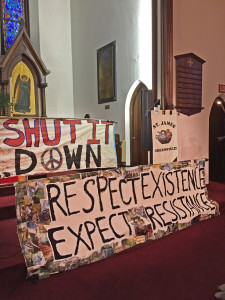
On Day #3 of a four-day, 46-mile walk to stop the construction of the Kinder Morgan NED pipeline, scores of activists gathered in the sanctuary of St. James Episcopal Church in Greenfield, Massachusetts, for a spirited rally organized by Sugar Shack Alliance. St. James Church is a grand old beauty of a building, a neo-Gothic stone structure that was consecrated in 1849. The sanctuary buzzed with excitement as a diverse crowd took their seats, many of them walkers eager for encouragement after a long day of tracing the route of the proposed pipeline on foot.
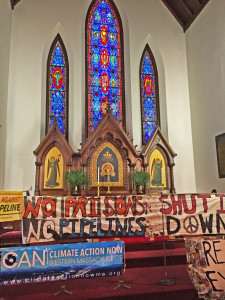 As a Christian climate activist, I found it stirring to realize that the rally was taking place on the eve of Palm Sunday, the day that Christians around the world step into Holy Week. Here were the stately altar and lectern arrayed in cloths of traditional red colors for tomorrow’s service, yet here, too, were banners draped across altar, pulpit and lectern, crying out in large letters: “No Prisons, No Pipeline. Shut It Down,” “Respect Existence, Expect Resistance,” and “Love Will Win.”
As a Christian climate activist, I found it stirring to realize that the rally was taking place on the eve of Palm Sunday, the day that Christians around the world step into Holy Week. Here were the stately altar and lectern arrayed in cloths of traditional red colors for tomorrow’s service, yet here, too, were banners draped across altar, pulpit and lectern, crying out in large letters: “No Prisons, No Pipeline. Shut It Down,” “Respect Existence, Expect Resistance,” and “Love Will Win.”
At first I was startled to see these messages spread out across the sacred space, but then I realized that their meaning was exactly right and resonated with Palm Sunday: we were here to celebrate non-violent confrontation with unjust power. On Palm Sunday, Christians remember Jesus’ entry into Jerusalem and the cheering crowds that cast palm branches on the ground to welcome him. Jesus was on a collision course with imperial Rome and all the powers of this world that rule by force and domination. He came to proclaim the power of God’s love. He came without armor or weapons, riding not a war-horse but a humble donkey, as the prophet Zechariah foretold: the king of peace would come on a donkey (Zechariah 9:9-10).
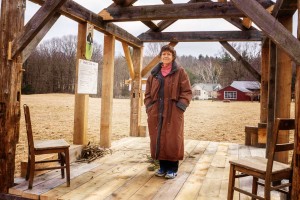
I think that Jesus would rejoice in the wave of non-violent action against fossil fuels that is rising up around the country. Growing numbers of individuals and groups are confronting the unjust political and corporate powers that hold society – and the very Earth itself – in a deathly grip. Resistance to fracked gas is mounting, from Seattle to Seneca Lake, from Ashland, Oregon to Ashfield, Mass., where last week Will Elwell, a local resident, constructed with his friends a replica of Thoreau’s Walden Pond cabin, placing it directly in the path of the proposed Kinder Morgan pipeline. On the eastern side of Massachusetts, in the West Roxbury neighborhood of metropolitan Boston, activists are fighting to stop the construction of the Spectra Energy pipeline project, which would bring highly pressurized fracked gas through a densely populated area and terminate at a station beside an active blast quarry.
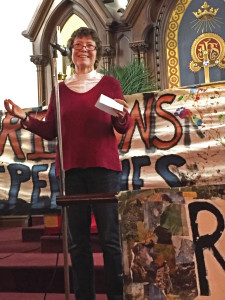
Whatever our faith tradition, the resolve to stand up for life and to resist a deathly status quo springs from a deep place in the human spirit. So I was grateful to have a chance to offer a brief word of blessing as the rally began. Looking out at the faces of all these good people who long as ardently as I do for a more just, peaceful, and sustainable world, I invited the crowd into a spirit of prayer. I called upon the Spirit of love, the divine Mystery that we call by many names, and I prayed to God:
“Through our own experience and in the words of your prophet Isaiah, we know that:
Those who hope in you
will renew their strength.
They will soar on wings like eagles;
they will run and not grow weary,
they will walk and not be faint (Isaiah 40:31).
“Thank you for the love that you pour into our hearts through the power of your Spirit (Romans 5:5).
“Thank you for your power working in us that can do infinitely more than we can ask or imagine (Ephesians 3:20).”
I asked God’s blessing on each person present and on the great work that we’ve been called to do.
After that, speakers came forward to articulate a particular argument for keeping so-called “natural” gas in the ground. Why were we struggling to block this pipeline? Because of our right to clear air and clean water. Because of the risk to public health from leaks and explosions. Because of conservation areas – farms and forests, scenic trails, wetlands, and rivers – that must remain intact. Because in Article 97 the constitution of our Commonwealth protects conservation lands and open space (a provision that the Tennessee Gas Pipeline Company is challenging aggressively in court). Because forced surveys of land violate the Fourth Amendment and constitute “unreasonable search and seizure.” Because we are committed to a clean energy economy. Because it is reckless to invest another dime in new fossil fuel infrastructure. Because we are pushing hard to avert catastrophic climate change.
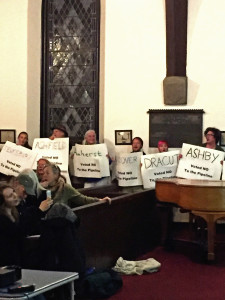
I was particularly touched by the remarks of cultural anthropologist Lisa McLaughlin of the Nolumbeka Project, who spoke about the ancient Native American burial grounds that must not be disturbed. She pointed out that in addition to the particular places that Native American tribes deem sacred, the whole landscape has its own “naturally sacred geography.” For Native Americans, she said, the struggle against the pipeline represents a clash of cultural values: one set of values considers the Earth to be profane and dead, with humanity entitled to dominate and exploit, and the other set of values views the Earth as sacred and alive, with humanity existing as part of nature.
The latter understanding is the perspective that Pope Francis lifted up in his encyclical Laudato Si, which in many ways draws from the best of the Judaeo-Christian tradition. A recent sermon by Br. Keith Nelson, SSJE, conveys beautifully this way of seeing the world. He writes: “We must become students of the air, the soil, the waters, the birds and beasts, whose simple being is prayer. From them, we must re-learn how to live well and live deeply in union with the Creator.”
People who protest gas pipelines, compressor stations, fracking wells, and other extreme forms of energy extraction are people who understand that human beings are connected to the larger web of life. We have a moral responsibility to bless the Earth and its inhabitants rather than to desecrate, destroy, and demean what has been entrusted to us.
The need to keep fossil fuels in the ground is urgent. February 2016 was the hottest of any month ever recorded, which crushed the record set in January, which crushed the record set in December. A recent climate report in the Washington Post bears the title, “Scientists Are Floored by What’s Happening in the Arctic Right Now.” Last year, 2015, was the hottest year on record.
In the face of the profound assault now being unleashed on our planet, what are we called to do? Once we know that “the heat accumulating in the Earth because of human emissions is roughly equal to the heat that would be released by 400,000 Hiroshima atomic bombs exploding across the planet every day,” what changes do you and I need to make in our work and witness?
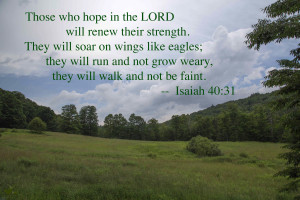
(image by Robert A. Jonas)
On Palm Sunday Jesus rode into Jerusalem with no army except a crowd of supporters and a handful of friends, most of whom soon melted away into the darkness, betraying him, denying him, or simply fleeing. He rode with no weapon but the weapon of truth, no power but the power of mercy, no strength but the strength of love. He entered the city with no weapon, and yet, the Gospel tells us, “the whole city was in turmoil” (Mathew 21:10) – it was shaken. The Greek word used here is one that describes an earthquake. The powers-that-be in this world are shaken up when the king of peace rides into town, when he rides into the boardrooms and back rooms of our country, when he rides into our hearts. There is an upheaval in the center of reality.
This is the holy upheaval that I glimpse in the climate movement. Some of us may suffer as Jesus suffered – indeed, the environmental activist for human rights and indigenous rights, Berta Caceres, was martyred in Honduras on March 3, 2016. We don’t know if our own efforts will succeed any more than Jesus’ did. After all, Jesus’ life apparently ended in failure: just days after his triumphal entry into Jerusalem, he was arrested, tortured, and crucified.
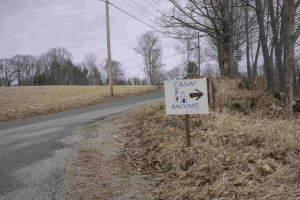
Yet faith beckons us to stand with Jesus against the power of Empire. And faith tells us that if we live in the spirit of Jesus, we, too, will be raised to new life in him. I grinned when I saw the “Cabin Raising” sign on the corner of Beldingville Road, pointing the way to the Thoreau-inspired cabin to protest the pipeline. On the sign, someone had crossed out “raising” and scribbled “raised.” Yes, that cabin has gotten raised, all right, and so have our spirits. A week after Palm Sunday, Christians will proclaim on Easter morning that Christ has risen. That is why we join the Jesus Movement: because we believe that love, not death, will have the last word. Because we know that those who hope in God will renew their strength; they will soar on wings like eagles; they will run and not grow weary, they will walk and not be faint.
